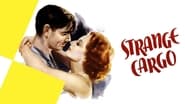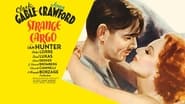davidfmaas
Paradox and Transformation in Strange Cargo David F. Maas
[email protected] Hawkins, TexasI have been enthralled by the movie Strange Cargo since seeing it as a nine year old boy on television in the middle 1950's. I purchased my own VHS copy of this movie in 1995, at the age of 51, watching it dozens and dozens of times, continually fascinated by the symbolism, the philosophical focus, and the stark adventure of a bold escape from a jungle penal colony controlled by the French off the coast of Guiana. This summer, at the age of 65, I bought a seasoned copy of Richard Sale's novel Not Too Narrow, Not Too Deep from Amazon.com, hoping to peel off a few more layers of meaning.Surprisingly, I concluded that Lawrence Hazard's screenplay was far superior to the Richard Sale novel upon which it was based, having a much tighter allegorical construction. Hazard thoroughly deconstructed the novel but stayed faithful to the philosophical core. The screenplay graphically describes the remarkable transformations or conversions from selfish to altruistic life views of six convicts and a sultry nightclub singer escaping to freedom through a dense tropical forest. The catalyst for their transformations is a mysterious Christ figure named Jean Cambreau (Ian Hunter). The sultry nightclub singer Julie (Joan Crawford), ordered off the island by the warden for fraternizing with the prisoners, falls in love with a thief Andre Verne (Clark Gable) after he reads to her the romantic words of Solomon's Song of Songs. She altruistically plans to resign herself to an unhappy marriage with M'sieu Pig (Peter Lorre), a professional stool pigeon, in order to allow Verne to escape. A ruthless killer Moll (Albert Dekker) altruistically sacrifices his life as he drinks from a cask which has absorbed salt water.Andre Verne, who almost escapes to freedom aboard a fishing boat, endangers his own life saving Cambreau, whom he has moments before attempted to drown. Paradoxically, Verne learns that true liberty or freedom consists not in escaping from law but in acquiescing to the law. Instead of deriving satisfaction from coveting and stealing things—he yielded to a wholesome love relationship and playing by the rules. He learned that when we play by the rules, we have freedom right now. Freedom and contentment is a condition independent from circumstances, a condition originating in the heart or mind.At the end of the movie, Cambreau and the fisherman (played by Victor Varconi) who nearly brought Andre Verne to freedom had a very telling dialogue:Fisherman: He won't be sorry? Cambreau: No fisherman. He won't. Fisherman: And everything will be all right for them someday? Cambreau: Everything is all right—now.


